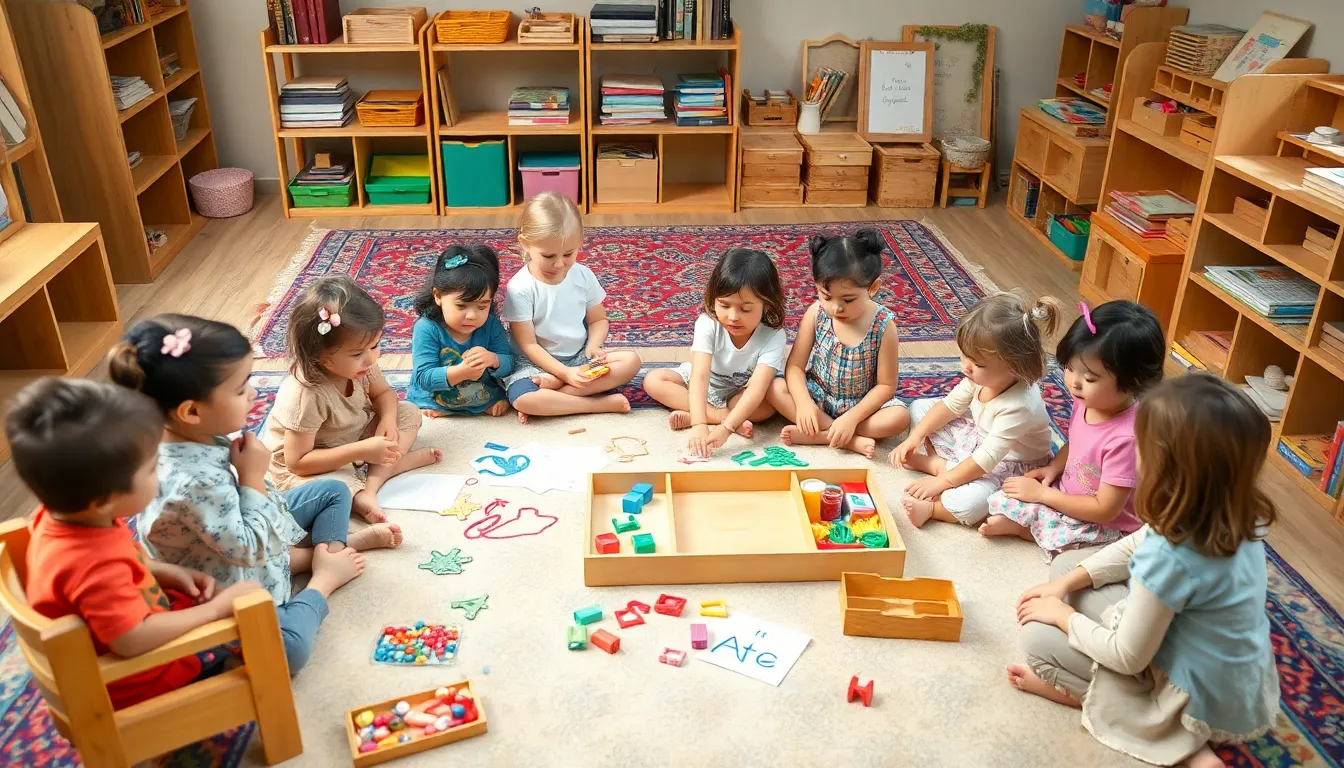Table of Contents
ToggleImagine a world where kids actually want to tidy up and learn. Sounds like a fantasy, right? Enter Montessori routines, the secret sauce to transforming chaos into calm. These routines aren’t just about keeping the toys off the floor; they empower children to take charge of their own learning and daily tasks.
In a Montessori environment, kids thrive on independence and responsibility, all while having a blast. Who knew that folding laundry could turn into a mini Olympic event? With the right routines, parents can turn everyday activities into fun, engaging lessons that set the stage for lifelong learning. Get ready to discover how these simple yet effective routines can make family life smoother and more enjoyable—because who wouldn’t want a little more joy in their day?
Overview of Montessori Routines
Montessori routines provide structure that enhances children’s learning experiences. These routines emphasize independence and self-discipline, encouraging kids to engage in purposeful activities. Daily schedules incorporate practical tasks, allowing children to develop skills essential for life. Each routine consists of elements that promote responsibility, such as care for themselves and their surroundings.
Specific routines target different developmental areas. Morning routines often include self-care tasks like dressing and grooming. Afternoon routines may involve quiet time or individual work, fostering concentration and focus. Evening routines can incorporate family activities, helping to build a sense of community.
Parents can implement Montessori principles at home. Designating specific times for certain activities allows children to anticipate and prepare for tasks. Establishing a predictable routine supports emotional security, as children thrive on consistency. Adjustments to routines can accommodate different needs, ensuring flexibility while maintaining structure.
The beauty of Montessori routines lies in their ability to transform ordinary moments into educational experiences. Regular participation in these routines can reinforce learning, making it enjoyable rather than a chore. Children learn through repetition, so involving them in these activities fosters a sense of achievement.
Creating a prepared environment plays a crucial role in successful Montessori routines. Organizing materials accessible to children empowers them to take initiative. Incorporating sensory experiences, such as tactile materials and hands-on activities, enriches their learning.
Montessori routines encourage a balance between freedom and responsibility, nurturing self-motivated learners. They also support family dynamics by allowing parents to engage in meaningful interactions with their children. Embracing these routines paves the way for a more harmonious household where children feel valued and empowered.
Key Principles of Montessori Education

Montessori education emphasizes personalized, engaging learning experiences. This approach cultivates a child’s natural curiosity and intrinsic motivation.
Child-Centered Learning
Child-centered learning focuses on the unique interests and developmental pace of each child. In this framework, children select their own activities, promoting autonomy. Engaging materials spark exploration, allowing them to learn through hands-on experiences. Teachers act as guides, observing children and facilitating learning opportunities. This process encourages deeper understanding as children connect new knowledge to prior experiences. Resulting in increased self-awareness, children build confidence and critical thinking skills.
Freedom Within Limits
Freedom within limits creates a structured environment where children thrive. Giving them choices fosters independence while setting clear boundaries ensures safety and responsibility. Activities promote decision-making, allowing children to experience the consequences of their choices. Balance between freedom and structure leads to productive learning. Setting expectations within routines helps children understand their role in the community. This dynamic nurtures respect for themselves and others, forming the foundation for positive relationships.
Benefits of Montessori Routines
Montessori routines offer significant advantages that enhance children’s development. Their structured approach fosters an engaging learning environment where children thrive.
Promoting Independence
Montessori routines empower children to take charge of their daily activities. Kids can choose tasks, promoting decision-making skills. Although guidance is important, children learn to manage their time and responsibilities. Creating a prepared environment supports this independence, as accessible materials invite exploration. Daily self-care activities, such as dressing and cleaning up, enhance self-sufficiency. By doing tasks independently, children build confidence in their abilities. Incorporating these routines helps kids develop problem-solving skills essential for future challenges.
Fostering Responsibility
Montessori routines encourage children to embrace responsibility early on. Assigning age-appropriate chores instills a sense of ownership in daily tasks. For example, children can help set the table or sort laundry, integrating practical skills into their routines. Consistent practice reinforces reliability, making kids more accountable over time. This structure teaches the importance of commitment and follow-through. As children engage in various activities, they learn the consequences of their actions, developing a sense of accountability. Overall, fostering responsibility through Montessori routines contributes to healthier family dynamics and supports meaningful interactions.
Implementing Montessori Routines at Home
Implementing Montessori routines at home fosters an organized environment that inspires children to engage in their activities meaningfully. These routines encourage a sense of responsibility and independence.
Creating a Prepared Environment
A prepared environment empowers children to initiate their learning experiences. Accessible materials, such as shelves with educational toys and activities, support autonomy. Organizing spaces invites exploration and creativity. Ensuring everything has a designated spot cultivates responsibility and orderliness. Sensory-rich materials, like textures and colors, enhance learning engagement, appealing to young children’s natural curiosity.
Daily Schedules and Activities
Daily schedules provide a structured framework for children’s activities. Morning routines can include self-care tasks, such as brushing teeth and dressing independently. Incorporating quiet time during the afternoon encourages focus and concentration. Evening family activities reinforce community bonds and shared experiences. Children thrive when they know what to expect, and flexibility within the schedule accommodates individual needs. Adjusting the routines according to the family’s dynamic enhances connection and joy in daily life.
Challenges and Considerations
Implementing Montessori routines can present certain challenges that parents and educators must navigate. Space limitations may arise, making it difficult to create an environment conducive to Montessori principles. An adequate area is necessary for children to freely explore materials and engage in self-directed activities.
Adjusting to new routines often takes time, requiring patience from both children and caregivers. Children might initially resist changes in their daily activities, needing support to embrace independence. Maintaining consistency proves essential, as fluctuating routines can hinder progress and confound expectations.
Parental involvement remains a key consideration. Parents must be firmly committed to the Montessori philosophy, modeling desired behaviors and supporting their child’s journey toward autonomy. Communication between parents and educators fosters a unified approach, ensuring everyone shares the same goals for the child’s development.
While fostering independence is crucial, setting appropriate limits is equally important. Children thrive in structured environments, yet they also require opportunities to make choices. Balancing freedom with boundaries facilitates decision-making skills while promoting a sense of responsibility.
The availability of resources can impact the effectiveness of Montessori routines. Parents should aim to provide developmentally appropriate materials that invite exploration. An organized space equipped with varied activities ensures children remain engaged and motivated throughout their learning process.
Finally, adaptability plays a significant role in successful implementation. Montessori routines should be flexible and responsive to changing needs, allowing families to adjust as circumstances evolve. Embracing a growth mindset helps all involved view challenges as opportunities for development, ensuring everyone enjoys the journey.
Montessori routines offer a powerful framework for nurturing independence and responsibility in children. By creating a structured yet flexible environment, families can foster meaningful engagement in daily activities. These routines not only enhance learning experiences but also strengthen family bonds through shared responsibilities and joyful interactions.
As children navigate their tasks, they develop essential life skills that contribute to their overall growth. Embracing Montessori principles encourages a balance of freedom and limits, allowing children to explore their interests while understanding the importance of boundaries. Ultimately, implementing these routines can transform everyday life into a fulfilling journey of discovery and connection for both children and parents.







